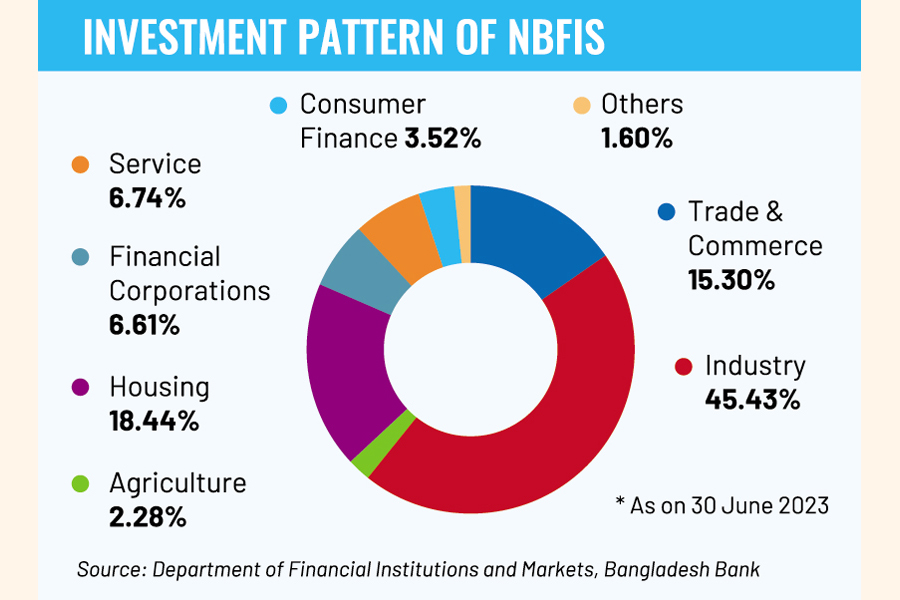
Published :
Updated :

Investments by non-bank financial institutions (NBFIs) in the industrial sector have shown a declining trend since fiscal year (FY) 2020-21.
Agriculture, housing, consumer finance and financial-corporation sectors also experienced a downturn in FY23 than FY22, according to the central bank's annual report for 2022-23.
Highlighting that NBFIs' investment is largely concentrated in the industrial sector, the Bangladesh Bank (BB) data reveals an uptick in their investment in trade and commerce in FY23.
The sector-wise composition of investment at the end of June 2023 stands as follows: trade and commerce 15.30 per cent, industry 45.43 per cent, agriculture 2.28 per cent, housing 18.44 per cent, financial corporations 6.61 per cent, service 6.74 per cent, consumer finance 3.52 per cent and others 1.60 per cent.
As of June 2022, provisional data indicates the following breakdown of NBFIs' investment at the end of June: trade and commerce 14.75 per cent, industry 45.73 per cent, agriculture 2.53 per cent, housing 19.07 per cent, financial corporations 6.56 per cent, service 6.93 per cent, consumer finance 3.66 per cent and others 0.77 per cent.
Reflecting on June 2021, the distribution of NBFIs' investment at the end of the month revealed the following percentages: industry 47.24 per cent, real estate 18.96 per cent, margin loan 1.15 per cent, trade and commerce 13.90 per cent, merchant banking 3.09 per cent, agriculture 2.46 per cent and others 13.20 per cent.
Total deposits (excluding inter-NBFIs) of the NBFIs increased by Tk 378.5 million or 0.08 per cent to over Tk 447.20 during July-September 2023 as compared to April-June 2023, according to the latest BB data.
During the July-September period, NBFIs experienced a notable increase in total loans and advances, surpassing Tk 733.38 billion, the data reveals.
This marked significant growth of more than Tk 8.99 billion or 1.24 per cent compared to the April-June 2023 period.
Within the NBFI sector, public NBFIs saw a substantial rise in loans and advances, exceeding Tk 113.29 billion during the July-September 2023.
This reflected an increase of more than Tk 8.25 billion or 7.86 per cent.
Private NBFIs also observed an uptick, with loans and advances reaching over Tk 620.09 billion, showcasing the growth of Tk 0.73 billion or 0.12 per cent during the same period, it said. Md Golam Sarwar Bhuiyan, managing director of IIDFC Ltd, highlighted several factors contributing to the decline in investment by NBFIs.
These include the current economic scenario, existing liquidity crisis, an increase in non-performing loans (NPLs), diminished credibility in NBFIs, and the rise in both policy and bank interest rates.
In the context of recovering non-performing loans from the hardcore poor, Mr Bhuiyan proposed that the new Finance Companies Act 2023 explore the option of easing regulations to mitigate the burden of NPLs.
Additionally, he recommended considering a more flexible approach to recovering the costs associated with funds from the hard-core poor.
To address the deposit ceiling set at Tk 5.0 million per person, Mr Bhuiyan said, the law specifies that an NBFI cannot accept deposits exceeding Tk 5.0 million from an individual.
This restriction may have implications for the sector, according to the IIDFC executive.
sajibur@gmail.com


 For all latest news, follow The Financial Express Google News channel.
For all latest news, follow The Financial Express Google News channel.